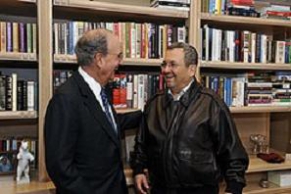|
World Jewish News

George Mitchell meets with Ehud Barak in his Tel Aviv home,
Saturday evening. Photo: Defense Ministry
|
Mitchell fails to convince Abbas to drop J'lem freeze demand
24.01.2010, Israel and the World US Middle East envoy George Mitchell was meeting for the second time in four days with Prime Minister Binyamin Netanyahu early Sunday morning, after apparently failing to budge Palestinian Authority President Mahmoud Abbas toward negotiations during their talks on Friday.
Mitchell met with Abbas in Ramallah for about three hours, but failed to get him to drop his insistence that Israel declare a complete construction freeze in the West Bank, including in east Jerusalem, before resuming negotiations.
While Mitchell was originally scheduled to fly back to Washington on Saturday, he asked for an additional round of meetings with Defense Minister Ehud Barak on Saturday night, and with the prime minister on Sunday morning. Mitchell already met separately with both Barak and Netanyahu on Thursday.
Netanyahu, in a press conference with foreign journalists last week, made clear that he thought that after a number of Israeli gestures toward Abbas - including acceptance of the principle of a two-state solution, lifting numerous West Bank roadblocks, and declaring a 10-month housing-start moratorium in the settlements - the onus to move now was clearly on the Palestinians.
But Abbas aide Saeb Erekat, after the Mitchell meeting on Friday, claimed the responsibility was Israel's.
"When we say a settlement freeze that includes Jerusalem. That is not a Palestinian condition," he said. "That is rather an Israeli obligation, and the same thing is applicable to our demand to have negotiations resume where we left them in December 2008."
Abbas and then-prime minister Ehud Olmert held talks for more than a year that concluded in December 2008. The content of those discussions was kept secret and no agreement was made public.
Nevertheless, in an interview with Newsweek in May, Olmert said he offered Abbas 93.5 to 93.7 percent of the West Bank along with a land swap equivalent to 5.8% and a safe-passage corridor from the Gaza Strip to the West Bank that would make up for the rest. He also agreed that the "holy basin" in Jerusalem - an area including the Old City and some areas outside the walls including the Mount of Olives cemetery - would be under no sovereignty at all and administered by a consortium of Saudis, Jordanians, Israelis, Palestinians and Americans; and that while rejecting the Palestinian claim for a right of return for refugees or their descendants, he did offer to allow into Israel a small number of refugees, as a "humanitarian gesture."
Abbas aides have said resuming talks was pointless as long as Netanyahu refused to pick up where Abbas and Olmert left off. Netanyahu's advisers have countered that those talks, which did not lead to any formal document, were not binding on the current government.
Erekat said Mitchell appealed to Abbas to resume negotiations immediately but the Palestinians disagreed and asked Washington "to have the Netanyahu government drop its conditions."
Senior sources in the Prime Minister's Office responded to Erekat by saying he was playing "word games."
A statement released from the Prime Minister's Office said that the Netanyahu government, since its formation in March, "has consistently called for the immediate resumption of talks without preconditions. The fact that talks have not taken place until now was clearly at the responsibility of the Palestinian side that has placed new unrealistic preconditions, preventing the resumption of talks."
These preconditions "were not placed on any previous Israeli government. This hardening of the Palestinian position has been the major reason for the prevention of new momentum in the process," the statement read.
Mitchell's apparent failure to broker any breakthrough in his current round of meetings comes just days after US President Barack Obama acknowledged, at the end of his first year interview with Time magazine, that his administration misread Israel and the Palestinians and raised too high expectations of a Middle East breakthrough.
By HERB KEINON. AP contributed to this report.
JPost.com
|
|
